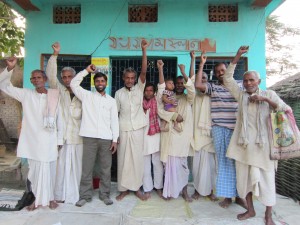 Starting a couple months back, a number of Streams started sprouting up in Bihar, AP, and Maharashtra, created by organizations we hadn’t heard of. Without our knowing or intervention, these groups set up and began broadcasting information regarding India’s NREGA program (Mahatma Gandhi National Rural Employment Guarantee Act) in their local communities. We were both thrilled and curious to learn more.
Starting a couple months back, a number of Streams started sprouting up in Bihar, AP, and Maharashtra, created by organizations we hadn’t heard of. Without our knowing or intervention, these groups set up and began broadcasting information regarding India’s NREGA program (Mahatma Gandhi National Rural Employment Guarantee Act) in their local communities. We were both thrilled and curious to learn more.
The Indian Government defines NREGA as a “guarantee for one hundred days of wage-employment in a financial year to a rural household whose adult members volunteer to do unskilled manual work.” It is an entitlement program that gives every rural household an income source that they are guaranteed by the government, each year.
On Streams, local organizations in these three states were broadcasting policy information and updating individuals on their status in the program. We later learned that this activity was being facilitated by a research group from Stanford’s Liberation Technology program. The researchers wanted to empower local NGOs, community groups, trade unions, and activists in these states with information technologies to bring more awareness and transparency to government schemes like NREGA. Along with SMS, they introduced Streams to groups to remove information barriers for people availing the schemes. In the process, they also collected grievances and conducted audits of local program offices to surface any malpractice.
The researchers observed some important insights regarding the applicability and uptake of Streams:
- People and organizations were thrilled to receive voice announcements
- Technologies not relying on an Internet connection (like Streams) is a must
- Administrators want detailed call reporting
- Mixing between soliciting voice and touchtone responses from Stream users caused confusion; some training may be required
Amongst the several Streams that were established, perhaps the most interesting story was about the one created by an individual, Sanjay Sahni. Sanjay is from Muzzafarpur, Bihar, and has only a 7th grade formal education. But he is a savvy and resourceful, and gained the respect of his community as an activist. Some time ago Sanjay suspected some corrupt activities were occurring in his local NREGA program office: the officers were creating fake jobs on the names of community members and pocketing the government pay-outs. Having limited technical skills and no English, Sanjay went to a local cyber cafe and managed to get onto Google. He typed the two words he knew: “NREGA Bihar”. Many results came up that he couldn’t understand, but he managed to get onto the government NREGA site which publishes all NREGA information in a transparent way. Clicking around with trial and error, Sanjay found a map of Bihar, and clicked on his district. He then managed to display a history of all work completed in his district; he recognized many of the jobs as fake. He printed the list and brought it back to his community. The people rallied behind him and demanded accountability from the local office.
Sanjay is a Streams power-user. He comments that Streams has made his advocacy work easier, and he is more empowered than ever to serve the community and hold local officials accountable to the people. Below is an interview with Sanjay describing the impact of Streams on his work and community:
[soundcloud url=”http://api.soundcloud.com/tracks/74483234″ params=”color=094700&auto_play=false&show_artwork=true” width=” 100%” height=”100″ iframe=”true” /]